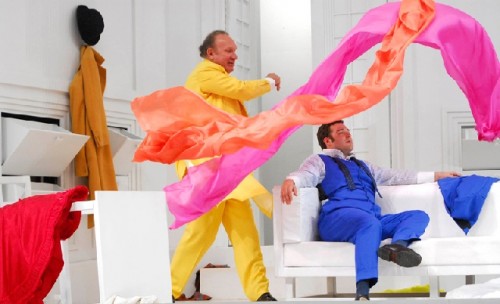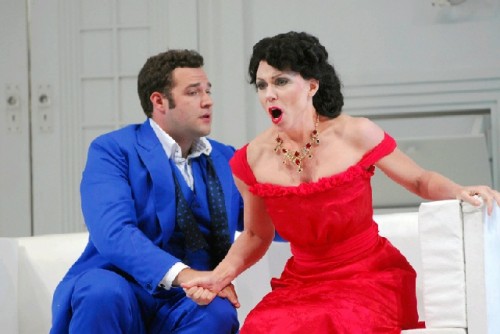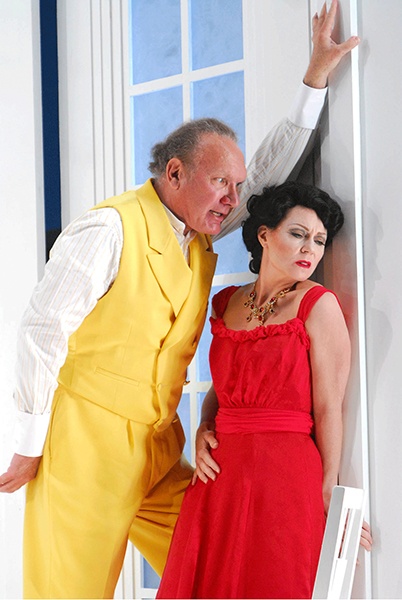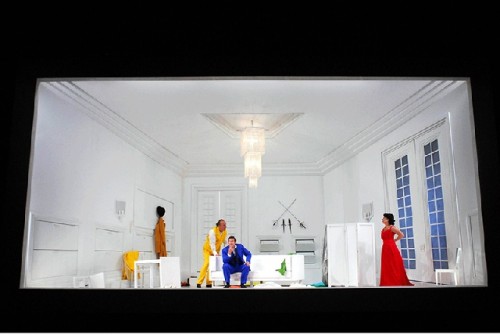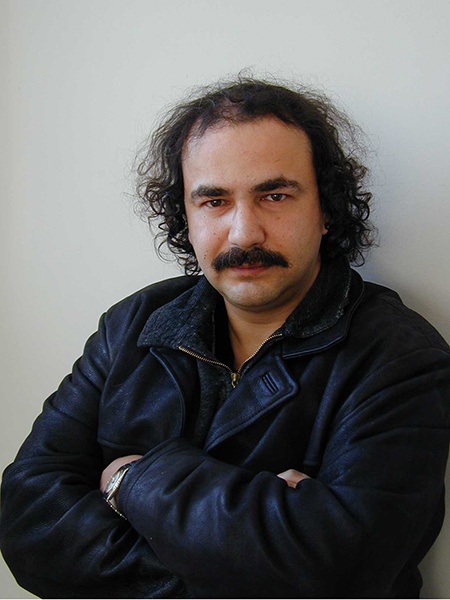Bard Summer Opera Preview: Zemlinsky's
Double bill of one act operas after Oscar Wilde
By: Michael Miller - Jul 25, 2007
Alexander von Zemlinsky (Vienna 1870 - Larchmont, NY 1942): Two One-Act OperasSung in German with English supertitles
A FLORENTINE TRAGEDY
(Eine Florentinische Tragödie)
Libretto by the composer, after the work of the same name by Oscar Wilde, translated by M. Meverfeld
THE DWARF
(Der Zwerg)
Libretto by Georg Klaren, after Oscar Wilde's story "The Birthday of the Infanta"
American Symphony Orchestra,
conducted by Leon Botstein, music director
Directed by Olivier Tambosi
McDermott & McGough, set and costume designers
Robert Wierzel, lighting designer
Warren Adams, choreographer
Sosnoff Theater, Fisher Center for the Performing Arts at Bard College, Annandale-on-Hudson, New York
July 27, August 2 and 4 at 8 pm
July 29, August 5 at 3 pm
Opera Talk
With Leon Botstein
Sosnoff Theater
July 29 at 1:30 pm
Free and open to the public
One of the most anticipated events of this summer is the Bard Summerscape opera production, a double bill of two little-known one-act operas by the Viennese composer Alexander von Zemlinsky, A Florentine Tragedy (1917) and The Dwarf (1922). Both based on works by Oscar Wilde, they are among the most highly regarded of Zemlinsky's eight operas. The libretto of A Florentine Tragedy is basically a translation of Wilde's unfinished play, while The Dwarf is an adaptation of Wilde's story "The Birthday of the Infanta." Both stories share something of the searing irony and brutality of Salome, which Richard Strauss had set to music so effectively in the years 1903 to 1905. In A Florentine Tragedy, set in the Italian Renaissance—a fashionable milieu in the late 1880's when Wilde wrote it—a draper's wife flaunts her affair with a young nobleman in the presence of her husband, who with mounting anger attempts to sell as much as he can to his rival, until the situation erupts in a swordfight, with a rather shocking peripeteia. In The Dwarf, based on one of Wilde's bitterest fairy-tales, the Infanta of Spain is given a misshapen dwarf as a birthday present. This dwarf, who was found in the forest by a member of the court, has no awareness of how hideous he is and dances merrily through life, much to the delight of the court and especially the Infanta. The girl, however, eager to extract as much amusement from him as she can, pushes him to the point where he discovers the truth and dies of a broken heart.
The intimate expression of personal issues is perhaps not most obviously associated with opera, but it appears that this began to change in the 20th century. Works like Moses und Aron, Mathis de Maler, and Billy Budd are deeply personal, and these two operas after Wilde are clear examples of operatic works which express the composer's deep personal feelings. Highly respected as a conductor, Zemlinsky was as much a public figure, although a less famous one, than Gustav Mahler, his rival for the affections of Alma Schindler. A very short and notoriously ugly man, Zemlinsky had little chance against the more favorably endowed Mahler. Zemlinsky obsessed about his failed passion for years, and he was still working on the matter artistically some time after Mahler's death, when, as director of the German opera (Neues Deutsches Theater) in Prague, he produced these two operas, one just towards the end of the Great War, and the other in 1922.
Zemlinsky continued on in Prague, in spite of a desire to return to Vienna, until an aritstic rivalry forced him to accept a subordinate position under Klemperer at the Kroll Opera in Berlin. Forced to leave Germany in 1933, he lingered on in Vienna until the Anschluss in 1938, working on Der König Kandaules, an opera based on André Gide's play about the murdered Lydian king, which was only finished and performed posthumously in 1993. Zemlinsky fled to New York with his wife, where he struggled against poverty for his few remaining years, not unlike Bela Bartók, whose music is also prominent in our musical season this summer, although in much greater obscurity.
Zemlinsky's music has enjoyed sporadic revivals in recent years, but none of his works has found a place in the standard repertory, although interest seems to be picking up. James Conlon, who has made something of a speciality of Zemlinsky, will be conducting a concert performance of A Florentine Tragedy with the New York Philharmonic in October. Whoever seizes this opportunity to see the colorfully staged—by Olivierr Tambosi, founder of Neue Oper Wien—productions at Bard over the coming week, will see them in the theatrical context which was so deeply a part of the composer's life, and he or she will be surprised at how accessible his sincerely felt and intensely expressed music actually is.
For an interview with Leon Botsein about these performances see the current Opera News.
Web: http://homepages.nyu.edu/~mjm11/index.html
e-mail: mailto:heliagoras@gmail.com


